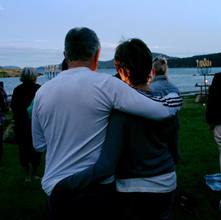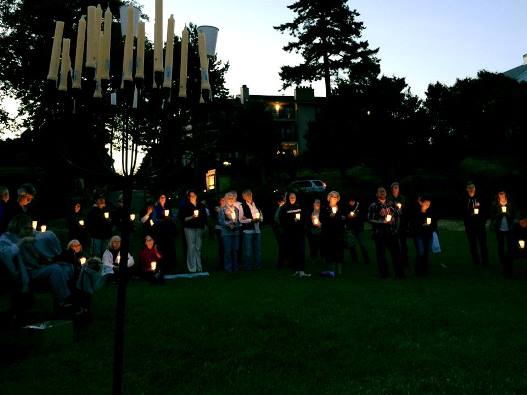— by Margie Doyle —
Three things happened this week, after many years a-brewing; three things that inspire, challenge and comfort me. I guess the tiny little bit of me that’s an engineer likes the “symmetry” of them — an international address, a national tragedy and a local remembrance.
The first was the inspiring encyclical, or world-wide address, of Pope Francis. He named it “Laudato Si,” or “Praise Be to You,” echoing the words of perhaps the first poem in the Western European vernacular, “The Canticle of the Sun” by St. Francis of Assisi.
In the two years since he was elected Pope, the South American Pope Francis has reawakened our consciences. (Not our judgment, for as he said early on in his papacy, “Who am I to judge?”) Instead he’s made us focus our gaze on those who lack what we have in abundance — health, stability, comforts, “the better things in life.”
And now he’s making us look at what we must do to repair the damage our excess and entitlement has done to the world. For what good is wealth if we live only in bipolar worlds of glamour and consumption versus hellholes of pollution, poverty and degradation? What good is material comfort if we’ve deadened our hearts and senses to the abandonment and exploitation of those less fortunate than us?
Pope Francis’ encyclical is not only a call to conscience, but also a call to action, on behalf of leaders of nations and worldwide institutions and corporations; and also smaller “leaders” in our Town Halls, homes, schools, shops. We can do better — individually and together — and the world can be a better place for it.
On the same day that “Laudato Si” was issued to the world, a national challenge that was tragically repetitious occurred — fear “cooked” into racism and violence at the historic Charleston church. The temptation for me is to wallow in despair and shame as an American. But surely these nine good people, like the children at Newtown and the theater-goers at Aurora, deserve a more fitting testament to the goodness and “humaneness” of their lives than despair. Despair is simply cowardice, in this case, in the face of our national tragedy and history of inhumanity that lives on in encouraging the concept of otherness, rather than life’s oneness and unity that Pope Francis’ words repeat over and over.
There grows a family of great recognition, respect and affection among people who come together for a cause. We see it among our church congregations, our fellowships such as Odd Fellows, Rebekkahs and Alcoholics Anonymous; among our Chamber of Commerce members; among the Farmers Market vendors and the parents of our schoolchildren. Is it ridiculous to think that if an adult had taken Dylann Roof under his or her wing and talked with him, or played with him, or went fishing with him or joined neighborhood clean-ups and recycling drives with him — if someone had showed him the beauty and unity and purpose of life rather than feed his fear and disaffection — he might have thanked the nine people who accepted him into their life of prayer and seeking instead of killing them?
At Sunday evening’s candlelight vigil at waterfront park, Pastor Dick Staub and Susan Osborn gathered with a small group of people to grieve — together and in silence — to call out the names and ages of the nine people who died, to sing of the balm that heals the heartsick soul and of amazing grace. They sheltered candlelight against the wind, and they embraced each other with hopes for peace and love. And they went home.
The third event of great impact this week was the coming together of our community to remember Larry Lindberg, former Orcas school superintendent and retirement advisor. I didn’t know Larry well, just served with him for a number of years on the Friends of the Library board. His great intelligence and wisdom was, ironically, somewhat masked by his geniality — who can forget that big grin and happy enthusiasm?
But he was no dummy, especially when it came to people. He had that uncommon and uncanny ability to bring out the very best in people without a sense of competition, but rather with a sense of living life to the fullest. I’ve seen him “in the trenches” too, when people’s vision got ensnared with their ego, and I’ve witnessed his light touch, the calm and respectful reasoning that brought about the best resolution to the matter. Drama was not his style, but respect for others and happiness was.
And as his son-in-laws said, “He played the game,” whether it was directing a non-profit board meeting, or running a school, or shooting traps or waiting in a hospital bed. He took part, and those who knew him are better for it.
So I’m left on this Sunday evening with a new sense of resolve and confidence. We can do more, from stepping up recycling, to holding legislators responsible for supporting gun safety measures, to conserving resources and reducing consumption, to increasing our compassion and respect for those who play this game of life a little differently than you or me.(A modest proposal — start with the Hazardous Waste Drop off this Saturday from 10 a.m. to 2 p.m.)
Oh we can do bigger things, and please let’s do them! In the words of Tennyson’s poem, “Ulysses,” It’s not too late to seek a better world… “to strive, to seek, to find, and not to yield.”
Our own Taj Howe, valedictorian and recent Orcas High School graduate, said recently, “Make your life a story worth telling, and be part of someone else’s too.”
In the words of Pope Francis I in his encyclical, “All is not lost. Human beings, while capable of the worst, are also capable of rising above themselves, choosing again what is good, and making a new start.”
Let’s make these words our own.
**If you are reading theOrcasonian for free, thank your fellow islanders. If you would like to support theOrcasonian CLICK HERE to set your modestly-priced, voluntary subscription. Otherwise, no worries; we’re happy to share with you.**










Margie, thank you for pulling these three events together with such an eloquence and poignancy.
Beautifully expressed, Margie!
What a gorgeous sharing of wisdom and hope. Thank you Margie.